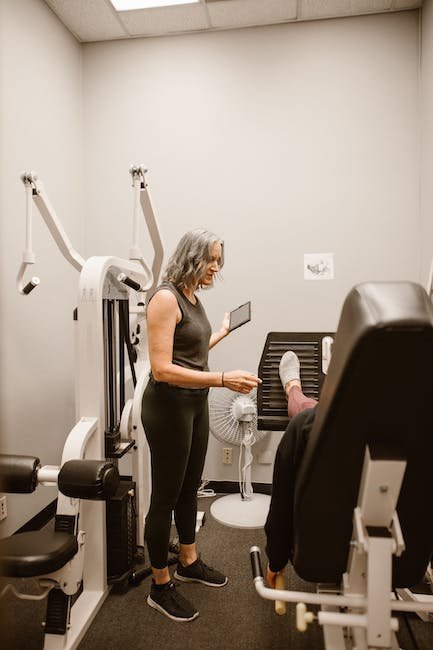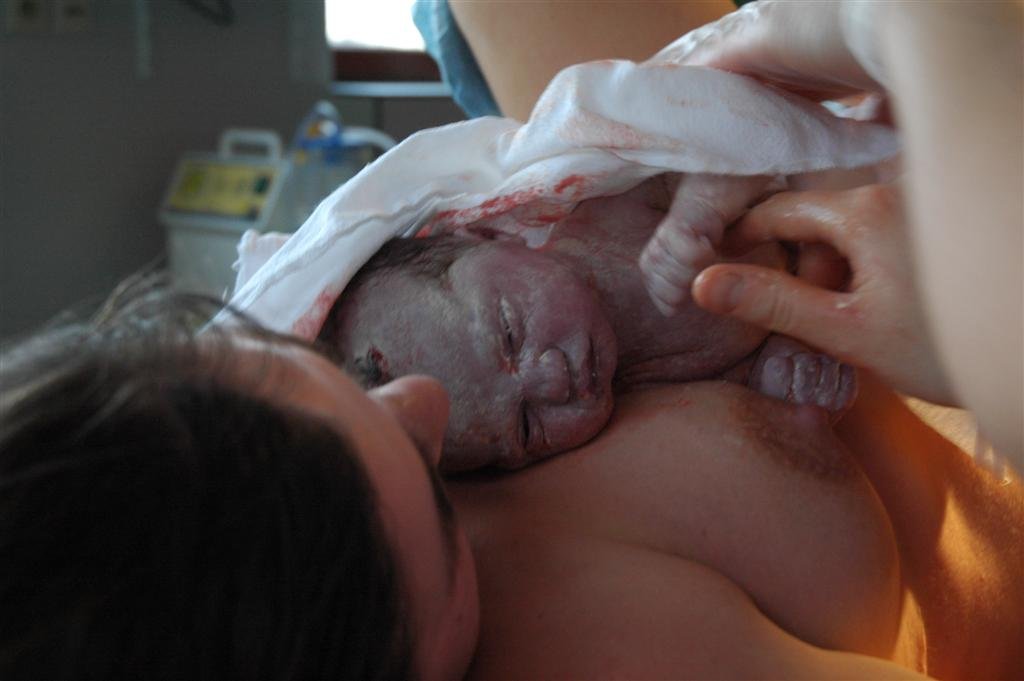Are you a new mom struggling with persistent back pain after childbirth? Well, worry no more! Having a bundle of joy is undoubtedly a magical experience, but it can also take a toll on your body. As you navigate the challenges of postpartum life, it’s crucial to prioritize your well-being, both physically and emotionally. This article is here to guide you through the wondrous journey of exercising safely with postpartum back pain. So, let’s delve into a world of gentle movements and expert tips to help you regain your strength and find relief.
Table of Contents
- Preventing Back Pain During Postpartum Exercise
- Understanding the Causes of Postpartum Back Pain
- Guidelines for Safe Postpartum Exercise with a Focus on Back Health
- Specific Exercises to Strengthen and Relieve Postpartum Back Pain
- Importance of Proper Posture during Postpartum Exercise
- Q&A
- Concluding Remarks

Preventing Back Pain During Postpartum Exercise
After giving birth, many women look forward to getting back in shape and reclaiming their pre-pregnancy bodies. However, it’s important to approach postpartum exercise with caution, especially when it comes to preventing back pain. Here are some tips to help you stay safe and pain-free as you ease back into your fitness routine:
- Start Slow: Your body has just been through a significant physical event, so it’s essential to start slow and gradually increase the intensity of your workouts. This will allow your muscles to rebuild strength and flexibility while minimizing the risk of strain or injury.
- Focus on Core Strength: Strengthening your core muscles, including your abdominal and back muscles, is crucial for supporting your spine and preventing back pain. Incorporate exercises such as gentle pelvic tilts, crunches, and planks to help rebuild your core strength gradually.
- Use Proper Form: Pay attention to your posture and form during exercises to avoid unnecessary strain on your back. For example, when lifting weights, maintain a neutral spine and engage your core. And remember, it’s always better to choose lighter weights and maintain proper form than to lift heavier weights with poor form.
By taking these precautions and listening to your body, you can enjoy a safe and effective postpartum exercise routine while minimizing the risk of back pain. Remember to consult with your healthcare provider before starting any new exercise program, and don’t hesitate to seek professional guidance from a qualified fitness instructor or physical therapist.

Understanding the Causes of Postpartum Back Pain
After the joyous experience of giving birth, many women find themselves facing a different kind of challenge – postpartum back pain. This discomfort, felt in the lower back, can range from mild to severe, and can significantly impact a new mother’s daily routine and overall well-being.
Several factors contribute to postpartum back pain, with the most common being the physical strain placed on the body during pregnancy and childbirth. The weight gain, hormonal changes, and increased pressure on the spine can lead to muscle imbalances and strain on the back muscles. Additionally, the process of labor itself can put tremendous stress on the lower back, causing temporary or long-term discomfort.
To further exacerbate the issue, new mothers often find themselves adopting poor posture while breastfeeding, lifting their baby, or carrying heavy diaper bags. This can lead to postural imbalances and muscle strain, adding to the underlying causes of back pain. Furthermore, hormonal changes during pregnancy and breastfeeding can loosen ligaments and joints, making them more susceptible to injury and instability.
Understanding these causes is crucial for addressing postpartum back pain effectively. By adopting healthy habits such as regular exercise, maintaining good posture, and utilizing proper lifting techniques, new mothers can alleviate and prevent back pain. Additionally, seeking professional guidance from physical therapists or chiropractors can help develop a personalized treatment plan to address the underlying causes and offer relief to the muscles and joints affected. Remember, taking care of your well-being is vital as you adjust to your new role as a mother.
Guidelines for Safe Postpartum Exercise with a Focus on Back Health
During the postpartum period, it is crucial to prioritize your health and well-being. As a new mom, incorporating safe exercise routines into your daily routine can have numerous benefits – not just for your physical health but also for your mental and emotional well-being. However, it is important to exercise with caution, especially when it comes to your back health. Here are some guidelines to help you navigate safe postpartum exercise while giving your back the attention it deserves:
- Listen to your body: Pay close attention to any discomfort or pain your back may be experiencing during or after exercise. If something doesn’t feel right, take a break or modify the activity to alleviate strain on your back.
- Start slowly and gradually: Remember, your body has gone through significant changes during pregnancy and childbirth. Start with low-impact exercises like walking or gentle yoga, gradually increasing intensity and duration as your body adjusts and strengthens.
- Focus on proper posture: Maintaining good posture is essential for protecting your back during exercise. Engage your core muscles, keep your spine aligned, and avoid excessive rounding or arching of your back. If needed, consult with a physical therapist or postpartum therapist for guidance.
- Incorporate strengthening exercises: Building back strength is crucial for preventing injuries and alleviating back pain. Include exercises that target your back muscles, such as back extensions, rows, or pelvic tilts, in your routine. Remember to warm up before engaging in any strength training exercises.
- Stay well-hydrated: Hydration is key for muscle function and overall health. Drink plenty of water before, during, and after exercise to keep your body hydrated and aid in recovery.
Remember, every woman’s postpartum journey is unique, so it’s essential to consult with your healthcare provider before starting any exercise program. These guidelines will help you establish a foundation for safe postpartum exercise, with a specific focus on nurturing your back health. Be patient with yourself, listen to your body, and enjoy the benefits of taking care of both your physical and emotional well-being during this special time.
Specific Exercises to Strengthen and Relieve Postpartum Back Pain
Specific Exercises: Strengthen and Relieve Postpartum Back Pain
Are you a new mom struggling with postpartum back pain? Don’t fret! We’ve got you covered with a selection of specific exercises designed to help strengthen your muscles and ease that discomfort. These exercises target the core, lower back, and pelvic floor, helping you regain your strength and alleviate the strain caused by pregnancy and childbirth.
1. Pelvic Tilts: This exercise is excellent for engaging your core and strengthening the lower back. Lie on your back with your knees bent, feet flat on the floor. Gently tilt your pelvis upward, pressing your lower back against the mat. Hold for a few seconds and release. Repeat 10-15 times.
2. Bridge Pose: This pose provides a great stretch for the back and helps tone the glutes. Lie on your back with knees bent, feet flat on the floor hip-width apart. Lift your hips off the ground, forming a straight line from knees to shoulders. Hold for a few seconds and lower back down. Aim for 10-12 repetitions.
3. Bird Dog: Strengthen your core and lower back with this simple yet effective exercise. Start on all fours, aligning your wrists directly under your shoulders and knees under your hips. Extend your right arm forward while simultaneously extending your left leg backward. Hold for a few seconds and switch sides. Perform 8-10 repetitions on each side.
Remember, consistency is key when it comes to postpartum recovery. Start slow and gradually increase the intensity of these exercises as you gain strength. Listen to your body and consult with a healthcare professional before starting any new exercise regimen. Bye-bye, postpartum back pain!
Importance of Proper Posture during Postpartum Exercise
As a new mom, finding time to exercise can be challenging, but maintaining proper posture during your postpartum workout is vital for your overall well-being and recovery. Here’s why:
- Optimal muscle activation: Correct posture ensures that the right muscles are engaged during each exercise, helping you to regain strength in your abdominal, back, and pelvic floor muscles.
- Preventing injuries: Postpartum bodies are more susceptible to injuries due to weakened abdominal muscles and hormonal changes. By maintaining proper posture, you can minimize the risk of strains, sprains, and other injuries during your exercise routine.
- Enhancing core stability: Good posture reinforces a stable core, allowing your body to move efficiently and reducing the likelihood of lower back pain. This is especially important as your body adjusts to the physical demands of motherhood.
- Improving breathing and circulation: Maintaining an upright posture helps open up your chest, allowing for better breathing and optimal circulation, which aids in the delivery of nutrients to your muscles and promotes faster recovery.
Remember, it’s not just about the quantity of exercise but the quality as well. Focus on practicing proper posture during your postpartum workout routine to maximize the benefits and ensure a safe and effective recovery.
Q&A
Q: What causes postpartum back pain?
A: Postpartum back pain can be caused by pregnancy-related changes such as hormone fluctuations, weakened abdominal muscles, and increased pressure on the spine from weight gain during pregnancy.
Q: Is it safe to exercise with postpartum back pain?
A: Yes, exercising can actually help alleviate postpartum back pain by strengthening the muscles supporting the spine. However, it’s essential to exercise safely and listen to your body’s limits.
Q: What types of exercises should I avoid?
A: Avoid high-impact exercises like running or jumping, as they may worsen your back pain. Additionally, exercises that involve heavy lifting or twisting movements should be avoided until your back pain improves.
Q: What are some safe exercises for postpartum back pain?
A: Gentle activities like walking, swimming, and prenatal/postnatal yoga can help relieve postpartum back pain while providing a low-impact workout. These exercises help strengthen your core muscles and improve flexibility.
Q: Should I consult a healthcare professional before starting an exercise routine?
A: It’s always recommended to consult with your healthcare provider before beginning any exercise regimen, particularly if you’re experiencing postpartum back pain. They can guide you on which exercises are safe and suitable for your condition.
Q: How can I prevent further back pain during exercise?
A: It’s important to listen to your body’s signals and avoid any exercises that cause pain or discomfort. If an activity aggravates your back pain, modify or try a different exercise. Engaging in proper posture and using appropriate equipment, like a supportive sports bra, can also help prevent additional back pain.
Q: Are there any specific stretches or exercises that target postpartum back pain?
A: Yes, there are several stretches and exercises that specifically target postpartum back pain. Pelvic tilts, gentle cat-cow stretches, and modified plank poses can all help strengthen your core and alleviate back pain.
Q: How long should I wait after giving birth to start exercising?
A: The timeline can vary for every individual, but it’s generally recommended to wait until your six-week postpartum check-up before starting an exercise routine. Always follow your healthcare provider’s advice regarding when it’s safe to start exercising.
Q: What are some lifestyle changes that can complement exercise in reducing postpartum back pain?
A: Maintaining good posture while sitting and lifting, wearing supportive shoes, using a firm mattress for sleep, and practicing stress management techniques can all complement exercise in reducing postpartum back pain. Additionally, regular breaks from sitting and incorporating gentle stretching throughout the day can be helpful.
Concluding Remarks
As we bid adieu to this article on exercising safely with postpartum back pain, let us take a moment to appreciate the remarkable strength and resilience that mothers possess. The journey of bringing a new life into this world is a beautiful one, but it can also come with its fair share of challenges.
We have delved into the depths of postpartum back pain and explored various exercises that can aid in relieving discomfort while regaining strength. Throughout this journey, we have emphasized the crucial importance of listening to your body, seeking professional advice, and taking it slow.
Remember, dear reader, that your journey to recovery is unique, just like your little bundle of joy. Be patient with yourself and allow your body the time it needs to heal. Rome wasn’t built in a day, and neither will your backache disappear overnight. Embrace the gradual progress and celebrate each step forward.
As you embark on your exercise routine, be cautious, but also be adventurous. Modify, challenge, and adapt the exercises to suit your needs. Seek the guidance of a healthcare professional or a qualified trainer to ensure that your workout plan aligns with your body’s requirements.
Never forget the power of a warm-up and cool-down session, the importance of core strengthening exercises, and the wonders that stretching can do for your muscles. Take heed of these valuable lessons and incorporate them into your routine, knowing that you are protecting not only your back but also your overall well-being.
The road to regaining your strength may be winding, but it is a road worth traveling. Rejoice in the small victories, bask in the knowledge that you are taking control of your health, and know that you are not alone on this journey.
May this article serve as a guiding light, gently leading you towards a healthier and pain-free future. May your backache become a distant memory, replaced by the joy and energy that motherhood brings.
So, dear reader, go forth with confidence, knowing that you possess the tools and knowledge to exercise safely with postpartum back pain. Embrace the power within you, savor each step, and remember that you are a warrior, conquering all obstacles on your path to recovery.
Wishing you strength, happiness, and a pain-free journey. Until we meet again!
As an affiliate, my content may feature links to products I personally use and recommend. By taking action, like subscribing or making a purchase, you’ll be supporting my work and fueling my taco cravings at the same time. Win-win, right?
Want to read more? Check out our Affiliate Disclosure page.